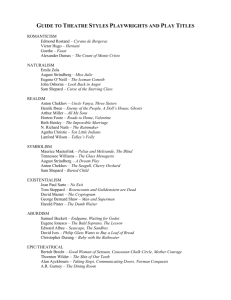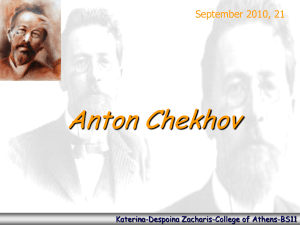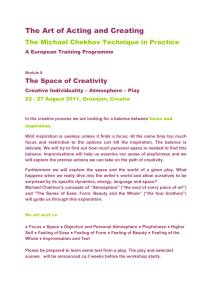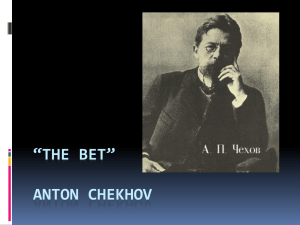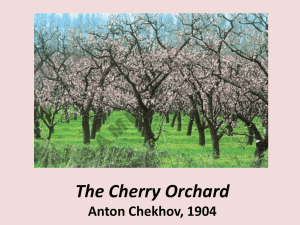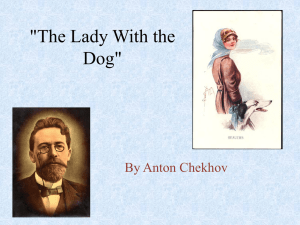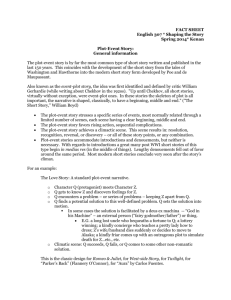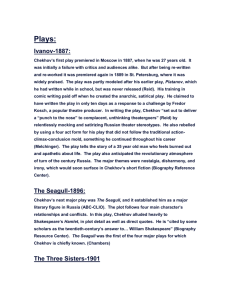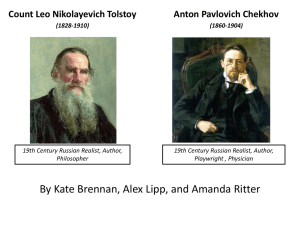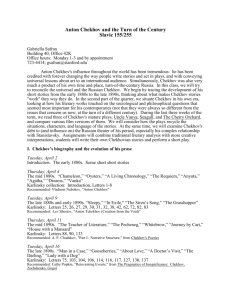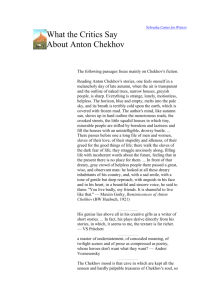European Michael Chekhov Workshop
advertisement
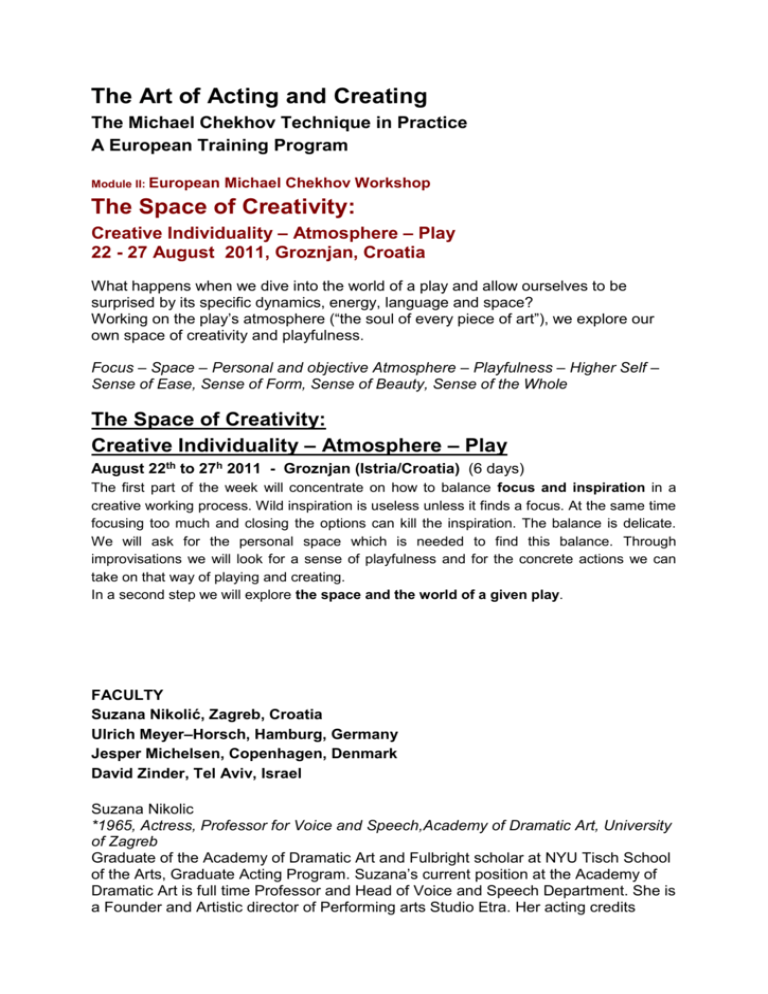
The Art of Acting and Creating The Michael Chekhov Technique in Practice A European Training Program Module II: European Michael Chekhov Workshop The Space of Creativity: Creative Individuality – Atmosphere – Play 22 - 27 August 2011, Groznjan, Croatia What happens when we dive into the world of a play and allow ourselves to be surprised by its specific dynamics, energy, language and space? Working on the play’s atmosphere (“the soul of every piece of art”), we explore our own space of creativity and playfulness. Focus – Space – Personal and objective Atmosphere – Playfulness – Higher Self – Sense of Ease, Sense of Form, Sense of Beauty, Sense of the Whole The Space of Creativity: Creative Individuality – Atmosphere – Play August 22th to 27h 2011 - Groznjan (Istria/Croatia) (6 days) The first part of the week will concentrate on how to balance focus and inspiration in a creative working process. Wild inspiration is useless unless it finds a focus. At the same time focusing too much and closing the options can kill the inspiration. The balance is delicate. We will ask for the personal space which is needed to find this balance. Through improvisations we will look for a sense of playfulness and for the concrete actions we can take on that way of playing and creating. In a second step we will explore the space and the world of a given play. FACULTY Suzana Nikolić, Zagreb, Croatia Ulrich Meyer–Horsch, Hamburg, Germany Jesper Michelsen, Copenhagen, Denmark David Zinder, Tel Aviv, Israel Suzana Nikolic *1965, Actress, Professor for Voice and Speech,Academy of Dramatic Art, University of Zagreb Graduate of the Academy of Dramatic Art and Fulbright scholar at NYU Tisch School of the Arts, Graduate Acting Program. Suzana’s current position at the Academy of Dramatic Art is full time Professor and Head of Voice and Speech Department. She is a Founder and Artistic director of Performing arts Studio Etra. Her acting credits include theatre performances, feature films, television films & serials, as well as radio. Suzana has being certificated as a teacher of the Michael Chekhov Technique in 2004 by MICHA, USA. She works professionally with the Technique over 15 years. Jesper Michelsen *1975, Director and Acting Coach, Artistic Director of Glad Teater, Copenhagen Originally trained as an actor, over the last ten years Jesper has been working mostly as an acting coach, director, dramaturge and producer in many different projects. He holds a BA in theatre studies and pedagogy from the University of Copenhagen. Jesper studied the MC Technique with MICHA (USA) and has been working with it in various workshops and programmes since 2003, teaching MC Technique alone or combined with Meisner- and other techniques. He is the co-founder of Glad Teater, a professional theatre and acting school for people with handicaps in Copenhagen. His special interest alongside training actors is the use of the body and the imagination in human development and creativity. Ulrich Meyer-Horsch *1963, Actor and Director, Michail Cechov Schauspielstudio Hamburg Has been working at Theater Kiel, Deutsches Schauspielhaus Hamburg, Theater Lübeck, Schauspiel Frankfurt, Altonaer Theater, Komödie Düsseldorf and Maxim Gorki Theater Berlin. His production of Bertolt Brecht’s “A Man’s a Man” has appeared at Lichthof Theater Hamburg (Pegasus Award 2008). Ulrich holds diplomas in theology, philosophy and theatre pedagogy from the Universities of Heidelberg, Hamburg and London (King’s College). He has worked with artists such as Simon McBurney and Complicite, Philippe Gaulier, Lorna Marshall and Yoshi Oida. He learned the Chekhov Technique from Chekhov’s former students Hurt Hatfield, Deidre Hurst du Prey, Mala Powers and Joanna Merlin, as well as during his training at Schule für Schauspiel Hamburg. He went to study with MICHA (USA) and has been teaching all over Europe since 1994. David Zinder Professor Emeritus of the Tel Aviv University Department of Theatre Arts, was a founding member of the Michael Chekhov Association, and has over three decades of experience in actor training and directing. Today he is a freelance international director. GENERAL INFORMATION PLACE & DATE Place: Date: From: Groznjan, The Academy of Dramatic Arts Monday 22 – Saturday 27, August 2011. 10.00h – 18.00h (incl. 2 hour break) We expect participants to arrive on Sunday late afternoon (August 21) and leave on Sunday morning (August 28). There will be a reception and introduction evening at 21,00 at the facilities of the Academy of Dramatic Arts. Working language: English / Participants can act in their own language Working group size: Approx. 15 to 25 persons The text will be announced. The Michael Chekhov Acting Technique As an accurate observer of the ‘creative process’, Michael Chekhov investigated the interplay between psyche and body, between ‘intangible and tangible’. He found simple and clear tools for the actor, based on the powers of Concentration and Imagination, the Psychological Gesture, the Imaginary Center and Atmosphere. Specifically applied, these techniques can guide the actor to the discovery of his/her character in a relatively short time. Chekhov’s method is not a mere technique, though. All the elements of his method go beyond intellect, private experience and the mere business of producing art. They are doors to your own creative potential. Technique is both craft and the knowledge how to use this craft. It’s an attitude towards the subject, the partner, the audience. However, there are no recipes. Part of the process is to learn to ask the right questions: questions which really meet your artistic needs and are appropriate to bring you a step further. Michael Chekhov (1891-1955) A nephew of playwright Anton Chekhov, he was widely recognized as one of the greatest actors of the 20th century. Michael Chekhov had a great talent for characterization and was a keen observer of the creative process. At the Moscow Art Theatre the collaboration between K. Stanislavsky, E. Vachtangov, V. Meyerhold and Michael Chekhov led to a theatre that was bold, expressive and imaginative. In their work they searched for objective principles that would lead to inspired acting. This investigation led Chekhov to develop his own psycho-physical acting technique, incorporating body and imagination. After leaving Russia in 1928 Chekhov spent eleven years in Europe - acting, directing and teaching. He worked with Max Reinhardt in Berlin and Vienna, founded his own company in Paris and directed for the theatres in Riga and the Baltic countries. In 1936 he opened the Chekhov Theatre Studio in Dardington Hall, England. In 1939 he moved to the United States, where he taught in both New York and in Hollywood. Michael Chekhov Europe Michael Chekhov Europe was founded in 2007 to build a platform for people who want to deepen their artistic work by means and inspiration of the Michael Chekhov Acting Technique. There has been a strong need to connect different initiatives from all over Europe and create an open space for research and training as well as taking new steps in understanding theatre and human creativity. Following Michael Chekhov’s artistic vision we want to disclose what it can contribute to both theatre and life in 21st century. Michael Chekhov Europe founding members come from Belgium, the Netherlands, Spain, Croatia, Germany, Finland, Denmark and Great Britain. Contact details: - Mrs Ljubica Anđelković (Academy of Dramatic Art; organisation, production): ljubica@adu.hr, tel. +385 1 4627 737 - Mrs Suzana Nikolić (Academy of Dramatic Art, project menager): suzana@adu.hr
